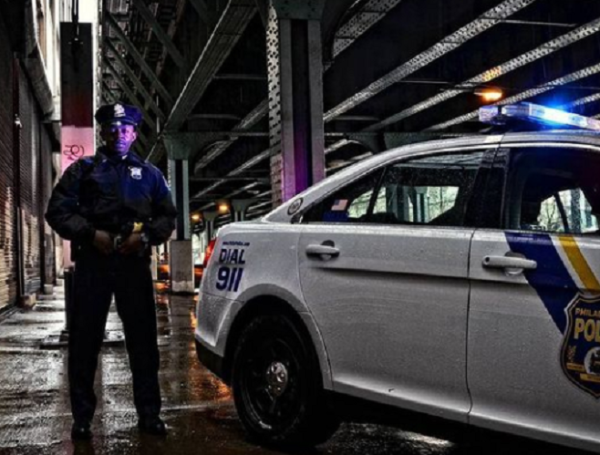
Mad scientists and their scorched earth mentalities recklessly editing cops from society, thus forfeiting the safety of citizens, is a study of power-craving politicos guaranteeing vulnerability, placing holiday season revelers (any season, really) in the trajectory of very bad actors.
Whether in council chambers or upper-floor fiefdom, elected officials governing jurisdictions who declare a parenthesized D with their name can conjure some pretty bizarre social experimentations, and somehow call it an initiative in public safety or reimagining the police or social justice reform or whatever half-baked hotcake they wish to plunge down your gullet.
They got the initiative part correct and failed at the heft involving logic. The true initiative should be to add, not subtract cops from duty-driven protection of citizens—just consult the bloated crime rates and ask loved ones of crime victims.
Heck, even children know better…
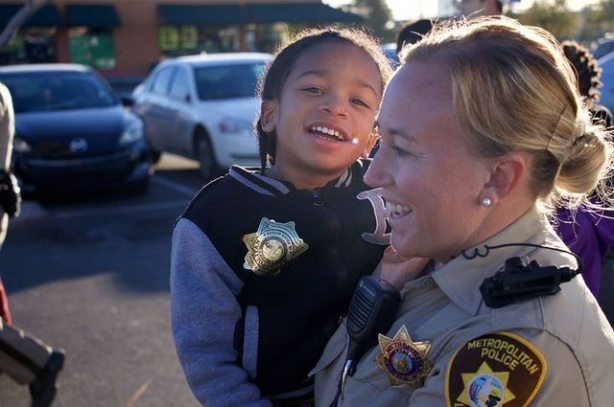
(Photo courtesy of the Las Vegas Metro Police Department Foundation.)
Some small sovereign governments within U.S. borders have resorted to diminishing police forces under the now-tarnished and heavily debunked defund-the-police and abolish-the-police movements. Some people never learn, though—just like criminals. Frankly, it is proverbially criminal what liberal leaders are enacting and inflicting upon a tax-paying public just trying to provide for their loved ones, free of victimization during that constitutional endeavor.
But…criminals don’t play nice. And fewer cops on streets means criminals hasten to the societal buffet like the Grinch descending upon Whoville.
Even though we seem to be getting over the hump of anti-police grandstanding, remaining are locales whose leadership forge forward with the antithetical premise of diluted police forces fighting the good fight against bad people.
Cops are intrinsic in American society. Still, some environs operate illogically by suspending logistical resources. This, at a time when homicide rates reach for Pluto.
In Philadelphia, Pennsylvania, law enforcement officers are no longer permitted to physically enforce certain minor traffic laws. Asserted “racial profiling” and “driving while black” is their reasoning for weakening public safety. A cop stopping a driver for unlawful (too dark) window tint has no way to distinguish the pigmentation of the person behind the wheel. Moreover, the Philadelphia police ranks comprise roughly 33% of Black cops, according to a 2016 report from Inquirer.
For as long as we have to restate it, we will: There is no evidence of cops barbarically affronting Black citizens as a matter of intent, wantonly killing people of color. Nor is there fact-patterned basis qualifying systemic police racism. Any anomaly to the contrary must be dealt with, so that the majority of phenomenal police work performed by integrity-laden selfless cops can be recognized accordingly, not negated by one-offs who betray the badge and misrepresent the collective guardians safeguarding all people in their community.
There is ample evidence that assigned police officers of any race, stewarding communities which happen to have Black residents within the beat, react to wrongdoing regardless of who is committing crime(s).
A passage in a Proceedings of the National Academy of Sciences study found “no significant evidence of antiblack disparity in the likelihood of being fatally shot by police.”
The Manhattan Institute’s Heather Mac Donald extrapolated that “the more frequently officers encounter violent suspects from any given racial group, the greater the chance that a member of that group will be fatally shot by a police officer.”
One Philadelphia city councilmember said this in June 2020: “The people policing the city of Philadelphia should look like the city of Philadelphia.” And they are screaming racism? Patronizing their racial composition proposal, what do they say when black cops arrest Black citizens for criminal deeds? What do they say when a cop of any race arrests Caucasian individuals?
Having filled duty boots, the order of the day was in concurrence with what the Wall Street Journal printed: “Crime and suspect behavior, not race, determine most police actions.”
While subjugating policing at breakneck speed, under the premise of racial profiling, competency and moral turpitude are apparently absent from policy orientations being pushed upon Philly’s entire 1.8 million population. It supplants competency for aesthetic appeal. One need only study America’s 18,000-plus law enforcement agencies to deduce racial compositions in police ranks does not automatically equate to imbalanced or unfavorable interactions among any human demographics. Conversely, statistical data bears out who is committing crimes against whom—with separate sources providing free and accessible to everyone.
Incidentally, a recent tabulation of Philadelphia demographics cited the city’s population and data pertaining to police diversity: “The Action News investigation found the Philadelphia metro area right about in the middle of the top 100 metro areas when it comes to police diversity.
“For Black representation, the tri-state area ranks 7th out of 100, with about 20 percent of the population Black, and a roughly equal percentage of law enforcement officers, according to the most recent census data,” investigation authors reported.
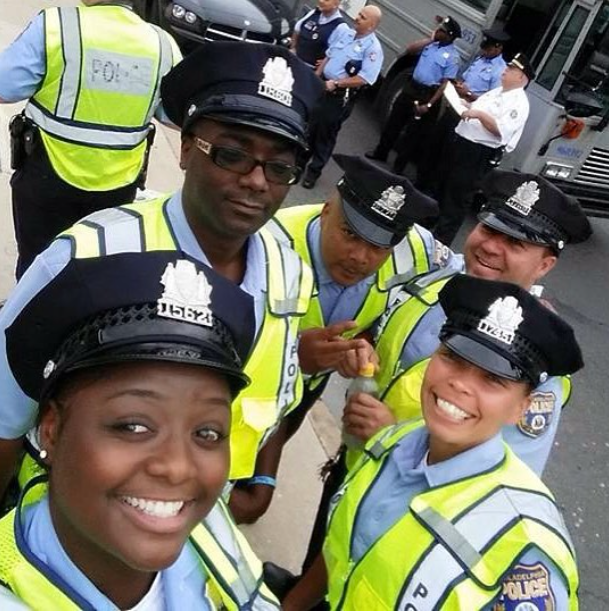
(Photo courtesy of the Philadelphia Police Department.)
The Philadelphia police commissioner is black. Philly police executive roles comprise diversity in both race and gender measures.
A concrete point in all this demographic diversity musing is that policing is inherently dangerous, thus not many people among all races step up to assume the role.
Interestingly, 6ABC News reported that “Outlaw is Philadelphia’s first Black female commissioner. She said her goal is to make her department 30 percent female by 2030. Currently, it is just over 20 percent. She’s also pushing to hire more Asian American officers.”
No matter how one looks at component parts, bad policy is bad policy. Just because one feels a certain way does not mean the laws are mutable. Leaders’ tunnel vision hampering cops deprives citizens of protections against incoming threats.
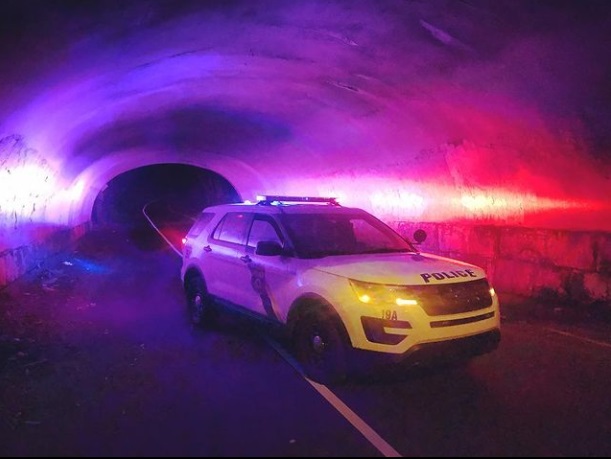
(Photo courtesy of the Philadelphia Police Department.)
And Philly’s bad policy may have deleterious implications toward something Police Commissioner Danielle Outlaw said in one of her department addresses extending deserved accolades to her sworn ranks: In 2020, “you took more guns off of the street than any other year in recent history.” Anywhere, USA, most guns taken off streets is due to cops making contact with motorists, often evolving from conducting “routine” traffic stops for minor motor vehicle infractions.
Also in 2020, a Pennsylvania Capital-Star piece titled “Philly homicides rose again in 2019; Blacks made up majority of victims, data shows” contained a curious paragraph, as follows:
“Hans Menos, executive director of the Philadelphia Police Advisory Commission, credited the police department with largely moving away from tough-on-crime policies to addressing violence as a public health problem and focusing on violence reduction.”
That statement in a report about homicide rates of Black citizens and cops moving away from tough-on-crime policies portends softer approaches to address hardcore stark realities in American society. That kinda calculus hurts my head, perhaps because it doesn’t jibe.
Cops being rebranded is not by their own choosing. Neither is being removed from the equation of traffic stops, with inherent public safety risks due to unchallenged statutory stipulations which are in the law books for a validated purpose—for everyone’s own good.
In effect, this nonsense signals to illicit-minded motorists (and/or their passengers) that they have the upper hand with regard to nefarious activities. To unleash dastardly deeds, killers use vehicles, not Pogo sticks.
It seems disrespecting constitutional law-and-order principles is the new norm among territories such as Philly and others adopting the same mind-bending and truth-twisting initiatives. The great reset comes with a large lie, namely that cops are the problem. Chock-full-o fallacies are a certain brand of politician who collectively concoct such maelstrom under the reform banner.
At this juncture in our nation, I do not think it is cocky to say reform measures are more aligned with the free flow of criminals than anything perceived problematic in the criminal justice gears.
Fewer police personnel patrolling and preempting evil-doers from committing often unspeakable things to innocents will, just like the madness of pulling back police in Seattle and Portland and Atlanta and other cities without backboned figureheads, potentiate awful incidents. In effect, fewer cops equates to increased victims of crime. Everyone’s inner muse should telegraph how much of a bad idea it is. Still, know-it-alls plod on. Lives are at greater risk. Miscreants giddily read about Philly’s hands-off approach. They plunder and, sadly, maim or murder citizens whose expectation of safety is betrayed by bad government.
Holiday season emphasizes increased population flows as citizens shop, travel to family gatherings, and revel in climate-based activities such as ice-skating or whatever. All of this implies mobility—getting in a car.
Unfortunately, a component of the aforementioned frolic and fun is the automobile operators who decide to imbibe spirits and impair operational abilities, essentially activating dangerous trajectories often impacting other motorists. Cars get twisted. Lives are lost, and everyone considers how such travesties could have been avoided. Yes, don’t drink and drive is one solution. When that fails muster, though, detection and prevention is a stalwart implemented by our courageous police forces around the nation.
Contextually-speaking, then, Philly authorities (the elected kind with zero police experience), aware of everything we just covered, maintain that sidelining cops from conducting traffic stops for violations of law is good policy. The real possibility is that a drunk driver stopped at a red light and whose license plate is expired, may not be detected by the odor of an alcoholic beverage due to the hands-off mandates instituted by politicos.
Invariably, we will learn of instances (one is surely too many) whereby an otherwise unhindered intervention by police may have saved a life or two or six…if prohibitions on traffic stops were not the order of local dictates.
I suspect Mothers Against Drunk Drivers (MADD), a formation of epidemic-focused, determined people who have lost loved ones to drunk driving, are aghast at such an impractical and imprudent ideology. Plainly, Philly’s model demonstrates coddling of criminals and sanctioning of public safety experts who’d ordinarily be out there safeguarding law-abiding citizens. Now’s a good time to remind that politicos swear an oath to uphold the law, abide constitutional tenets, and serve constituents. I can’t imagine the heralded notions being cheapened in favor of self-aggrandizement ushered by reckless abandon.
Early on in my police career, I joined the Community Traffic Safety Team (CTST), a consortium of state, county and local law enforcement officers, Florida Department of Transportation (DOT) traffic engineers, state prosecutors, victims’ rights advocates, business corridor executives and proprietors, members of MADD’s state and local chapters, and pretty much anyone whose mindset was anchored in traffic/pedestrian safety.
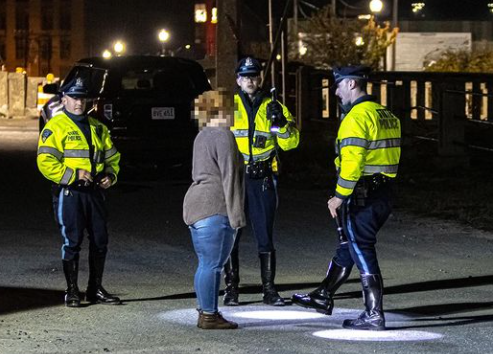
(Photo courtesy of the Massachusetts State Police Association.)
Once a month, everyone I just mentioned joined in a large conference hall either at the local Florida Highway Patrol Troop (station) or, right next door, at the DOT regional hub. Endemically, we analyzed data and discussed all-things-traffic (huge upticks ushering in school semester starts), especially honing in on public safety initiatives pertaining to motoring, bicycling, and pedestrian crossings.
DUI specialists (troopers, police officers, deputies) presented data encompassing cars stopped for suspected drunk-driving, arrests made, how many were “frequent flyers” (several DUI arrests), and other criminal charges imposed by the fundamental factor of cops stopping cars pursuant to conferred probable cause authority.
Although I just outlined safety initiatives in Florida and highlighted increased vigilance to address burgeoned traffic flow and mitigation of traffic infractions and concomitant criminal activity on wheels, these factors pertain around the planet, including Philly and similar jurisdictions which entertain foolish policies regarding hands-off policing (contrarian, I know).
Years ago, Florida rolled out a statewide campaign for law enforcement officers to assure public safety by ensuring even the most minute traffic infraction would be attended. The initiative was called “Beyond the Tag,” implying small things must be addressed, reflective of Broken Windows Theory applications.
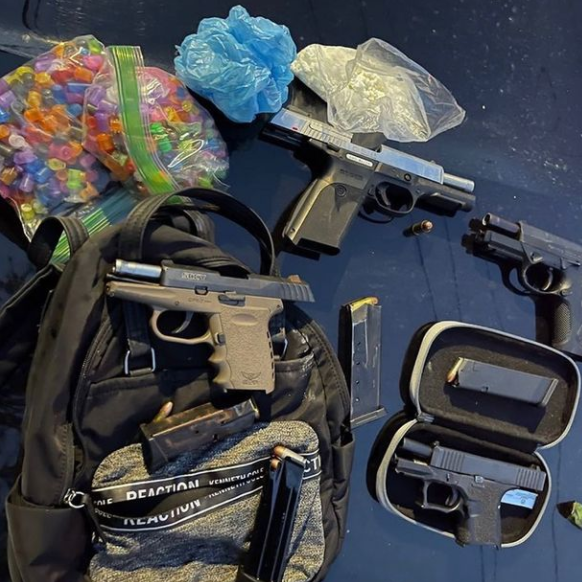
(Photo courtesy of the Baltimore Police Department.)
In police culture, every LEO knows from bona fide experience that addressing seemingly minor violations often unearths larger-scale crimes.
Given our topic today, I reminisce one particular midnight shift when I pulled over a car for a “minor traffic offense” such as an obscured license plate. In a nutshell, the cavalry came when the police dispatcher conveyed the code for “Wanted for murder” via radio frequency. With Philly’s logic, can you see how this murderous fugitive from justice operating an automobile could have slithered on by, potentially ending other lives down the road?
Can you see how Philly and other traffic enforcement-less jurisdictions are shooting themselves in the foot and, by virtue signaling, their constituents? What about that political office oath they swore, and the value of spoken words while hand blankets a Bible? Sell-out?
As I write this, I have imagery of deeply saddened faces of loved ones whose shattered lives stem from collision-course catastrophes in which their husband, wife, son, daughter, father, mother, cousin, or always-there neighbor are no more.
It was always bittersweet to gaze upon a church decorated with Christmas ornamentations and the fragrances synonymous with seasonal celebrations. Preluding Christmas and the soon-after New Year revelry, I attended annual MADD-hosted vigils to honor lost lives who unfortunately found themselves in the pathway of impaired drivers, never to celebrate holy holidays or any day ever again.
Similar to funerals for cops killed in the line of duty, some by drunk drivers rolling down roadways and plowing into LEOs working various transportation-enforcement functions, are the commemorations of lives lost stemming from impaired operators. The number of fatalities is enormously impactful to cops who wish they could split themselves in six to be more places at once to preempt tragedies.
I attended every annual memorialization and, year after year, the throat lumps never waned; wearing Class A uniform, to include necktie, always punctuated those hard swallow moments…compelling ideations of doing much more when out on patrol. (In this context, Philly cops must feel utterly betrayed.)
Witnessing broken hearts whose sobs were laden with intermittent gratitude to law enforcement for “being out there and trying to prevent these tragedies” always echoed the police mission and underscored objectives of public safety.
Tone-deaf government leaders going against the grain of plausible safety features, namely cops, invites otherwise avoidable casualties at a time when Americans are reeling from pandemic-induced setbacks exacerbated by malfeasants preying on vulnerabilities. Plausible denial will not save face of the decision makers who negate plausible public safety features performed by police officials.
Seems ludicrous to feel the need to say this: citizens deserve and expect more police protection, not less, especially at a time when we are emphasizing seasons heralding joy and gratitude and peace, not commiserating over catastrophes caused by unmitigated dangers aboard transportation modes.
So, what is going on in the City of Brotherly Love?
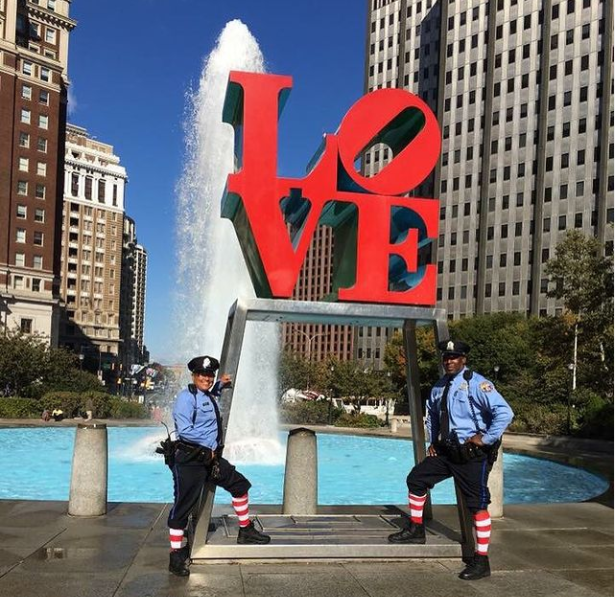
(Photo courtesy of the Philadelphia Police Department.)
Philly police being subjected to political prisoner status? Doesn’t this policy brazenly forfeit citizen safety?
Bottom line: Unimpeded criminals only commit more crimes, before moving on to the next ones, and that may be part and parcel why a Gallup poll tallied a majority of Black Americans favoring police presence.